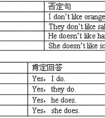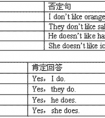—In those days, TVs were really expensive, and I couldn't . —Neither could we.[ ]A. afford ones B. afford one C. buy it-九年级英语
题文
| —In those days, TVs were really expensive, and I couldn't . —Neither could we. |
| [ ] |
| A. afford ones B. afford one C. buy it |
答案
| B |
据专家权威分析,试题“—In those days, TVs were really expensive, and I couldn't ...”主要考查你对 实义动词,不定代词 等考点的理解。关于这些考点的“档案”如下:
实义动词不定代词
考点名称:实义动词
- 实意动词:
即行为动词,表示动作的动词。实义动词与系动词是相对的,能独立用作谓语。
它分为及物动词和不及物动词两种:
及物动词是指后面要求有直接宾语的动词;
不及物动词指后面不需要跟宾语的动词。 实意动词使用方法:
及物动词
后面必须跟宾语意义才完整的实义动词,叫做及物动词(transitive verb)。如:
I believe that the committee will consider our suggestion.我相信委员会将会考虑我们的建议。
“How long can I keep the book ?”Harry asked.哈里问:“这本书我可以借多久?”
Dr. Bethune set us a good example. 白求恩大夫给我们树立了好榜样。
Crude oil contains many useful substances.原油含有许多有用的物质。
不及物动词
本身意义完整后面不须跟宾语的实义动词,叫做不及物动词(intransitive verb)。如:
Birds fly.鸟会飞。
It happened in June 1932.这件事发生于一九三二年六月。
My watch stopped.我的表停了。
She spoke at the meeting yesterday evening. 她在昨天晚上的会上发了言。
兼作及物动词和不及物动词
英语里有不少实义动词可以兼作及物动词和不及物动词。这样的动词又有两种不同的情况
a)兼作及物动词和不及物动词时,意义不变。试比较:
Shall I begin at once?我可以立刻开始吗?(begin作不及物动词)
She began working as a librarian after she left school.她毕业后当图书馆管理员。(began作及物动词)
When did they leave Chicago?他们是什么时候离开芝加哥的?(leave 作及物动词)
They left last week. 他们是上周离开的。(left 作不及物动词)
b)兼作及物动词和不及物动词时,有时意义不尽相同。如:
Wash your hands before meals.饭前要洗手。
Does this cloth wash well? 这布经得起洗吗?- 英汉实意动词用法比较:
与汉语的比较,有时英语动词的及物和不及物的用法,与汉语的用法不一样,请注意下列两种情况:
a)有的动词在英语里只能用作不及物动词,而汉语则可用作及物动词,如arrive到达,agree同意,listen听。英语里这些动词后面常接介词。如:
We arrived at the railway station at noon.
我们于中午到达火车站。(at不能省去)
(比较:We reached the railway station at noon.)
Everybody listened to the lecture with great interest.
每个人都很有兴趣地听讲课。(to不可省去)
(比较:We all heard the lecture.)
Do they agree to the plan?他们同意这个计划吗?(to不可省去)
b)有的动词在英语里能用作及物动词,而在汉语里则不能用作及物动词,如serve为…服务。
Our children are taught to serve the people wholeheartedly.
我们的儿童被教以全心全意为人民服务
用于be动词之后,实义动词之前。 实意动词的用法:
肯定句:
主语+动词过去式+其它
否定句:
主语+助动词didn‘t+动词原型+其他
一般过去式:
Did+主语+动词原型+其他
考点名称:不定代词
- 不定代词:
即不指明代替任何特定名词或形容词的代词。
初中常用不定代词有:
some(something,somebody,someone),any(anything,anybody,anyone), no(nothing,nobody,no one),
every(everything,everybody,everyone,),all,each,both,much,many,(a)little,(a)few,other(s),
another,none,one,either, neither等。一般来讲,修饰不定代词的词要置于其后。 不定代词用法例举:
①一般用于肯定句中的不定代词:some, someone, somebody, something
例如:They can speak some Japanese.
②一般用于否定句、疑问句和条件句中的不定代词:any, anyone, anybody, anything
例如:Is there anyone at home?
③一般用于句中表示否定意义的不定代词:no, no one, nobody, nothing
例如:I have no watch.
There is nothing wrong with the machine.
④不定代词one指代可数名词,既可指人,亦可指物,它可以代替上文中出现的单数可数
名词,指代复数名词时可以用ones。
例如:I do not have a pen, can you lend me one?
I like small cars better than large ones.
⑤none通常只用作名词,在句中作主语、宾语等。意为“没有任何(人或物)”,既可指人,亦可指物。
none后常跟of短语,其后用复数可数名词或不可数名词。
例如:None of them knows the answer to the question.
⑥both, all
both指两个人、物或群体;
all指三个以上的人、物或群体或泛指一切事物。
例如:My parents are both teachers.
All of my friends are football fans.
⑦every, each
each一般用于指两个或两个以上的人或物,侧重个别;
every用于指三个或三个以上的人或物,侧重全体。而且each所指对象在上下文中已十分明确。
例如:Each student went to see that films. (学生至少二人)
Every student went to the park.(学生至少三人)
⑧other, the other, others, the others, another
other具有名词和形容词性质,既可指人,亦可指物。other常与定冠词the连用。
不定冠词an与other连用则组成another。other只作形容词或代词,表示“其他的,别的”,不可单独使用。
例如:Do you have any other questions?
the other作形容词或代词,特指两者中或两部分的另一个或另一部分。
例如:The bookshop is on the other side of the street.
others相当于“other+名词”,泛指“别的人或物”,只有名词性用法。
例如:Some are planting trees, others are watering them.
the others相当于“the other+名词”,表示“剩下的,其余的”,特指除此之外的全部 人或物。
例如:There are forty-six students in our class. Two of them are foreign, the others are all Chinese.
another作形容词或代词,泛指三个或三个以上不定数目中的“另一个”。
例如:This pen is too expensive, please show me another.
⑨either, neither
either指“两者中的任何一个”;neither指“两者中无一”,具有否定意义。
例如:You can take either half.
Neither of the books is good.
⑩many, much, most
many和much具有名词和形容词的性质,都表示“许多、大量”。
Much一般只能指代或修饰不可数名词,many只能指代或修饰复数可数名词。Most指“大部分、大多数”。
例如:Many boys like playing soccer.
- 最新内容
- 相关内容
- 网友推荐
- 图文推荐
| [家长教育] 孩子为什么会和父母感情疏离? (2019-07-14) |
| [教师分享] 给远方姐姐的一封信 (2018-11-07) |
| [教师分享] 伸缩门 (2018-11-07) |
| [教师分享] 回家乡 (2018-11-07) |
| [教师分享] 是风味也是人间 (2018-11-07) |
| [教师分享] 一句格言的启示 (2018-11-07) |
| [教师分享] 无规矩不成方圆 (2018-11-07) |
| [教师分享] 第十届全国教育名家论坛有感(二) (2018-11-07) |
| [教师分享] 贪玩的小狗 (2018-11-07) |
| [教师分享] 未命名文章 (2018-11-07) |


![How much does it ______ to fly from Yancheng to Hainan Island?[ ]A. cost B. payC. spend D. take-七年级英语](http://www.00-edu.com/d/file/ks/4/2/shiyidongci/2020-01-05/small7dcf2f05998de63e10cc3629787031c81578210087.png)

![He always _____TV in the evening. He _____ listening to the radio. [ ]A. watch, don't like B. watches, doesn't like C. watching, don't like D. watch, do-七年级英语](http://www.00-edu.com/d/file/ks/4/2/shiyidongci/2020-01-05/small45d599b4a60b84e61cec210bfbf051f51578214524.png)
![I'd rather ___ to the Mcdonald's Restaurant because I like to listen to quiet music.[ ]A. to go B. going C. go D. went-八年级英语](http://www.00-edu.com/d/file/ks/4/2/shiyidongci/2020-01-05/small1767bba1727fef2c035c53dcbd9bc20e1578209517.png)
